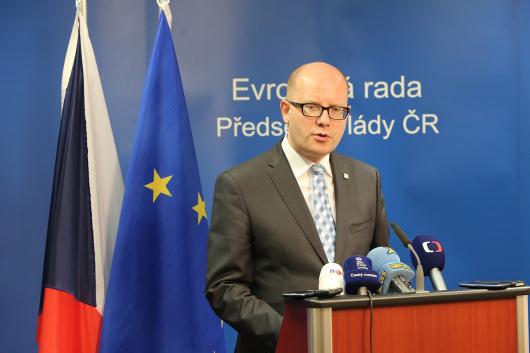
Czech PM: We need to strengthen EU cohesion, not deepen the trenches
16.09.2016 / 11:51 | Aktualizováno: 16.09.2016 / 13:56
“Our common path must be aimed at strengthening EU cohesion, not deepening the trenches”, writes the Czech Prime Minister Bohuslav Sobotka ahead of the Bratislava summit.
In recent years, the European Union has been plagued by several crises, from the financial to the migration situation, and now the crisis of confidence. These events have laid bare the fact that the EU tends to be slow and wavering in coming to grips with its problems. Even the outcome of the UK referendum should be viewed as another symptom of the malaise we face as a community. It is up to us alone whether, in these circumstances, we fall prey to doubts. Another option is to sidle up to those who rub their hands with glee when the branch they themselves are sitting on snaps. The final alternative is to take hold of the status quo as an impetus to improve the way the European Union as a whole functions. I am for this third option, as I am convinced that it is best not only for Europe, but also for the Czech Republic and its citizens.
That is why I and other EU leaders, at the June European Council, confirmed our shared commitment to continue building a safe, politically strong and economically successful Europe. This process can be fruitful only if we manage to disconnect it from the crisis management to which the Union has often had to resort under pressure of events, and if we go back to a rational, systematic approach. It is the scramble to frantically seek solutions to recurring crises, a strategy naturally fraught with mistakes and problems, that tarnishes the image of the European Union most in the eyes of its citizens and partners.
The European Union is, more than anything else, a community of states, and it is up to us to inject its future direction with fresh impetus. I believe that trust and cohesion are central to continuing European integration. These two ingredients are crucial if cooperation between Member States is be amplified. Our common path must be aimed at strengthening trust between Member States, not at deepening the trenches between the cliques within the Union. Our citizens are increasingly pointing to Member States’ inability to find common solutions to the key issues that are of direct concern to their everyday lives. We need to change that.
At the Bratislava Summit this Friday, I will concentrate on two topics that are absolutely crucial from this perspective: first, prosperity and economic cooperation; and secondly, the Union’s internal and external security.
When it comes to ensuring security within the European Union, the main priorities are quite clearly the fight against terrorism, based on effective police cooperation and the exchange of relevant information, including that obtained by intelligence agencies, the prevention of radicalisation, and the stemming of financial flows used by terrorists. Full control of external borders, a prerequisite for the efficiency of the Schengen system, is equally important.
In addition to this internal dimension, we need to show the same intensity in addressing the external aspects of security. The Union already wields highly effective foreign-policy instruments, such as the neighbourhood policy, development assistance and trade policy. To ensure the European Union’s acceptance as a true global player, it must be able and willing to engage in the protection of its citizens’ interests even beyond its borders. We can pursue this goal by setting up a European Security and Defence Union and initiating a process geared towards the gradual formation of a European army. The aim is not to compete with NATO, but to move forward with purely European security priorities in our neck of the woods, including the fight against terrorists and people-smugglers and our response to humanitarian crises and the disintegration of certain states.
Citizens rightly expect that the Union, besides keeping them safe, will help to ensure that they enjoy a decent standard of living. The financial crisis has stalled the process of economic convergence, both within and between individual Member States, and this has long dented the economic and social situation of the Union as a whole. Convergence, though, is a key objective that we should be pursuing as it addresses much of the turmoil we face today. We already have a number of tools that we can use to promote convergence and economic growth, especially a smoothly running internal market with its four freedoms (free movement of goods, services, persons and capital), extensive support of investment, trade policy, cohesion policy, and its backing of research and development. We advocate a digital economy and we are building an Energy Union. A truly European approach entails the even-handed development of all four freedoms, and in doing so we need to resist the temptation to curb any of them, no matter how beneficial thus may seem in the short term. We must respond to globalisation with keener competitiveness based on investment in education and innovation. All this must be accompanied by a functioning welfare state that guarantees cohesion and the permeability of society.
In Bratislava, we will be deciding how to change the European Union. And I will do all I can to ensure that the future of the Union is as close to its citizens as possible and comes up with answers to their real problems and concerns.




